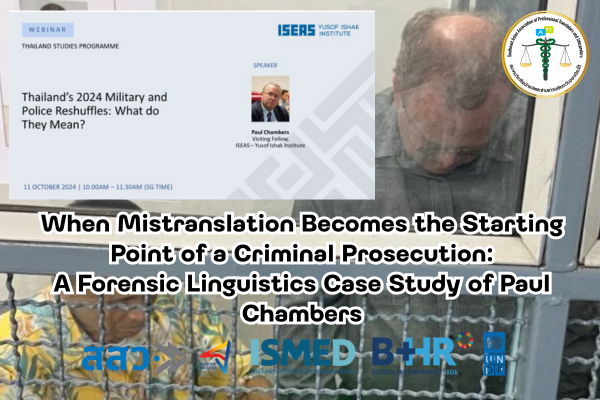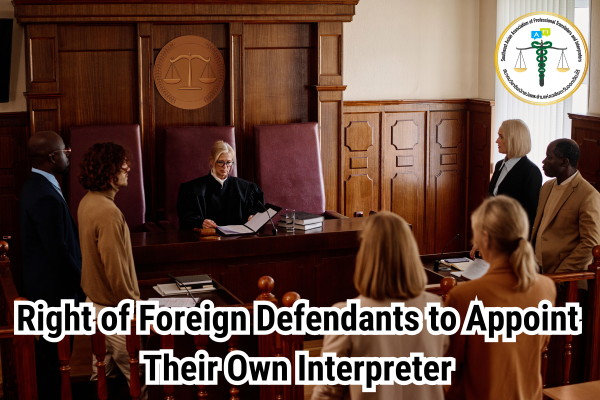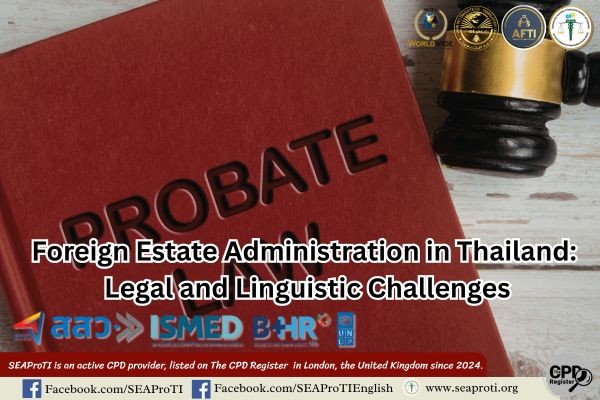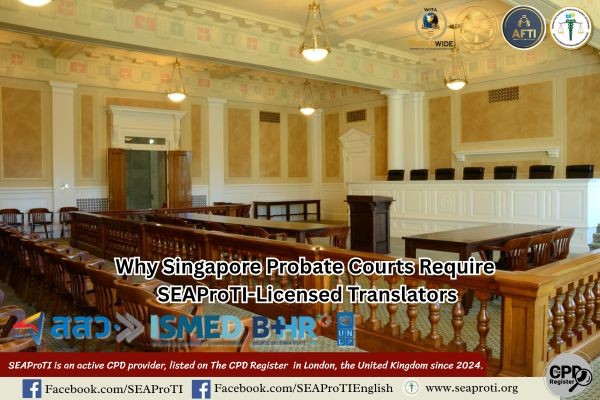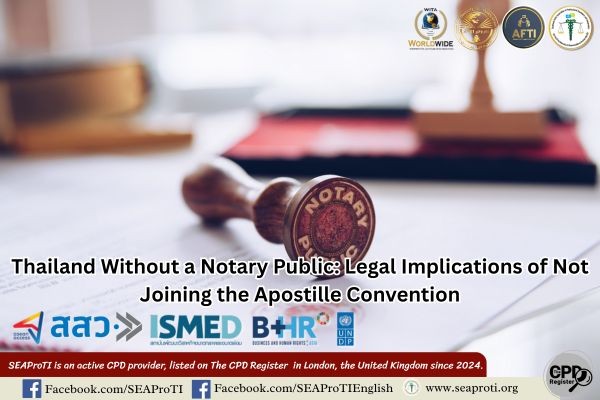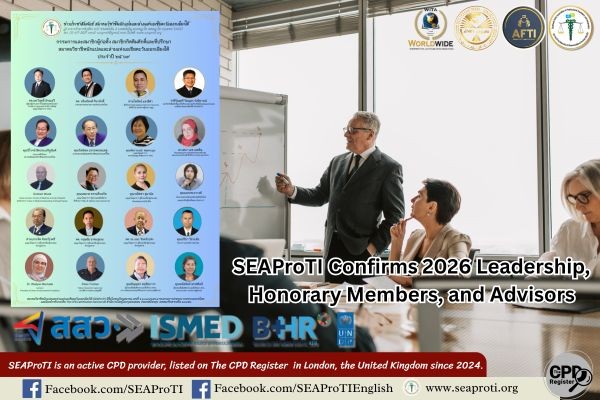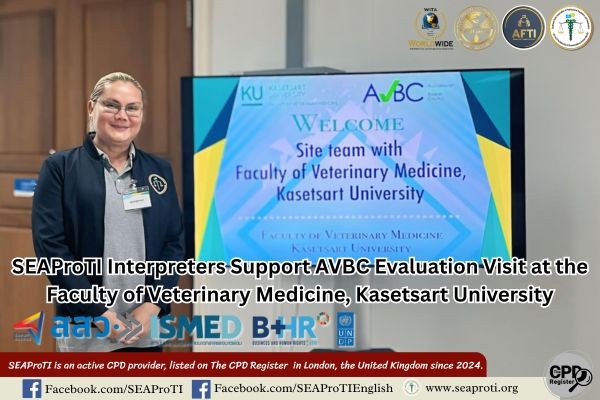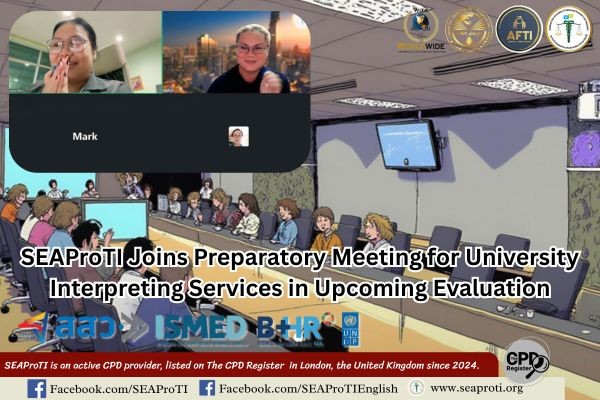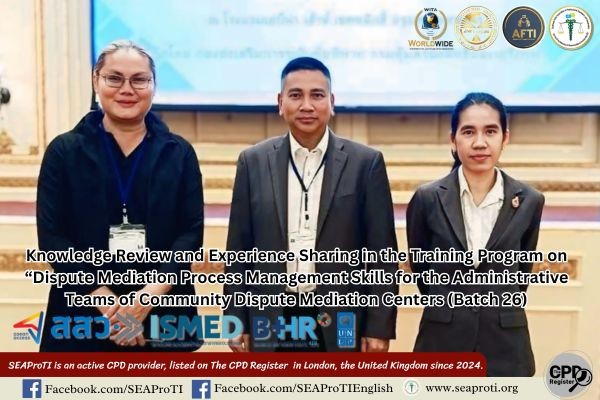When Mistranslation Becomes the Starting Point of a Criminal Prosecution:
A Forensic Linguistics Case Study of Paul Chambers
25 April 2025, Bangkok – On 27 February 2025, Phitsanulok Provincial Police Station received a formal complaint against Dr. Paul Chambers, an American academic, alleging that he had violated Section 112 of the Thai Criminal Code (lèse majesté) and the Computer Crimes Act, based on his involvement with content concerning military and police leadership reshuffles in Thailand. The accusation was based on an event flyer published by the ISEAS – Yusof Ishak Institute in Singapore, titled:
“Thailand’s 2024 Military and Police Reshuffles: What do They Mean?”
The crux of the case lies in the translation of the English-language flyer by an individual lacking expertise in legal language or legal interpretation. The police reported that the translation had been conducted by a lecturer at a Rajabhat University, and that the translated version was then used as evidence to pursue criminal prosecution.
1. The Context of the Original Document
The document at the center of this case is an online event flyer, published by ISEAS, with the sole purpose of promoting an academic webinar. It is not an academic article, editorial, or opinion piece authored by Dr. Paul Chambers.
The content uses academic language to preview a discussion on Thailand’s security leadership. It includes statements such as:
“In this discussion, Dr Paul Chambers will explore who the new appointees are…”
This sentence refers to topics to be discussed in a future event. It is not content that has already been published or expressed, and it does not mention or refer to the monarchy either directly or indirectly.
2. Translational Inaccuracy: A Systemic Issue That Demands Scrutiny
The police stated that they relied on a translation produced by a “lecturer at a Rajabhat University” to determine that the content violated Section 112, concluding that the material defamed, showed ill will toward, or insulted the monarchy.
Critical questions that must be asked include:
- Did the translator understand the legal framework and elements of Section 112?
- Did the translator distinguish between academic context and malicious intent under the law?
- Was the translator able to identify the difference between an event flyer and a critical article?
Without a background in forensic linguistics or legal language, a translator is highly likely to misinterpret the content and contribute to an unjust prosecution.
3. The Role of Forensic Linguistics in the Justice System
Forensic linguistics is the study of language within the context of law, especially when English phrases may carry multiple meanings and legal implications. Terms like “explore” or “factions they represent” cannot be translated literally without considering context and the speaker’s intention.
Translators lacking this foundation may:
- Misinterpret “will explore” as a “revelation of false or harmful information” rather than a neutral statement about future discussion topics
- Confuse references to the military or civilian government with references to the monarchy
- Fail to assess the surrounding evidence, such as the document type and purpose
4. Consequences of Faulty Translation: From Words to Criminal Charges
An inaccurate translation can lead to:
- Unlawful prosecution that lacks a legal or linguistic basis
- Revocation of a visa and violation of a suspect’s fundamental rights prior to a full investigation
- Severe damage to the credibility of Thailand’s justice system in the eyes of the international community
5. Policy and Procedural Recommendations
- The government should establish a forensic linguistics review committee to evaluate sensitive materials with potential legal consequences before criminal action is initiated.
- Law enforcement agencies should employ certified experts in legal and forensic translation, not general language instructors lacking legal training.
- Police procedures for accepting translated documents as evidence should require review by qualified forensic linguists before a formal complaint is logged.
Conclusion
The case of Dr. Paul Chambers is a clear example of systemic vulnerability in the justice process, where a translation, devoid of legal context and linguistic nuance, became the basis of prosecution under one of Thailand’s most severe criminal statutes.
Until the legal system can answer the question of who is qualified to translate what, we will continue to see innocent individuals wrongly targeted due to linguistic misunderstanding.
Explore more:
* Watch the video: Parliamentary Defense Committee Debates Controversy: Was Dr. Paul Chambers Charged Under Section 112 Due to a Misunderstanding of English? (Click here)
*
SEAProTI’s certified translators, translation certification providers, and certified interpreters:
The Southeast Asian Association of Professional Translators and Interpreters (SEAProTI) has officially announced the criteria and qualifications for individuals to register as “Certified Translators,” “Translation Certification Providers,” and “Certified Interpreters” under the association’s regulations. These guidelines are detailed in Sections 9 and 10 of the Royal Thai Government Gazette, issued by the Secretariat of the Cabinet under the Office of the Prime Minister of the Kingdom of Thailand, dated July 25, 2024, Volume 141, Part 66 Ng, Page 100.
To read the full publication, visit: the Royal Thai Government Gazette
เมื่อการแปลผิดพลาดกลายเป็นจุดเริ่มต้นของการดำเนินคดีอาญา: กรณีศึกษาเชิงนิติภาษาศาสตร์จากคดี Paul Chambers
25 เมษายน 2568, กรุงเทพมหานคร – เมื่อวันที่ 27 กุมภาพันธ์ 2568 สถานีตำรวจภูธรเมืองพิษณุโลกได้รับคำร้องทุกข์กล่าวโทษต่อ ดร. พอล แชมเบอร์ส นักวิชาการชาวอเมริกัน โดยอ้างว่ามีการกระทำความผิดตาม ประมวลกฎหมายอาญา มาตรา 112 รวมถึง พระราชบัญญัติว่าด้วยการกระทำความผิดเกี่ยวกับคอมพิวเตอร์ จากการเผยแพร่เนื้อหาเกี่ยวกับการโยกย้ายตำแหน่งทหารและตำรวจในประเทศไทย โดยอาศัยต้นเรื่องจากเอกสารประชาสัมพันธ์ของ ISEAS – Yusof Ishak Institute ประเทศสิงคโปร์ ที่มีชื่อว่า:
“Thailand’s 2024 Military and Police Reshuffles: What do They Mean?”
สาระสำคัญในคดีนี้อยู่ที่ การแปลเอกสารภาษาอังกฤษโดยผู้ที่ไม่มีความเชี่ยวชาญด้านกฎหมายหรือภาษากฎหมาย ซึ่งตำรวจระบุว่าเป็นอาจารย์จากมหาวิทยาลัยราชภัฏแห่งหนึ่งที่ได้รับมอบหมายให้แปลข้อความดังกล่าว และผลของการแปลดังกล่าวถูกใช้เป็น หลักฐานในการดำเนินคดีอาญา
1. บริบทของเอกสารต้นทาง
เอกสารที่เป็นปมในคดีนี้คือ สูจิบัตรออนไลน์ (event flyer) จากเว็บไซต์ของสถาบัน ISEAS ซึ่งมีวัตถุประสงค์เพื่อประชาสัมพันธ์งานสัมมนาวิชาการ ไม่มีลักษณะเป็นบทความวิจัยหรือบทความความเห็นส่วนตัวของ ดร.แชมเบอร์ส
ในเนื้อหาใช้ภาษาวิชาการในการวิเคราะห์สถานการณ์การแต่งตั้งผู้นำฝ่ายความมั่นคงของไทย โดยมีถ้อยคำเช่น:
“In this discussion, Dr Paul Chambers will explore who the new appointees are…”
(ดร.แชมเบอร์สจะกล่าวถึง… ในการอภิปรายครั้งนี้)
ประโยคดังกล่าวมีลักษณะเป็นการบรรยายหัวข้อเสวนาในอนาคต ไม่ใช่เนื้อหาที่ถูกเผยแพร่แล้ว และ ไม่ได้มีการกล่าวถึงหรือพาดพิงสถาบันพระมหากษัตริย์โดยตรงหรือโดยนัย แต่อย่างใด
2. ความคลาดเคลื่อนในการแปล: ปัญหาเชิงระบบที่ต้องตั้งคำถาม
ตำรวจอ้างว่าใช้การแปลจาก “อาจารย์มหาวิทยาลัยราชภัฏแห่งหนึ่ง” เป็นหลักฐานในการระบุว่าเนื้อหานั้นเข้าข่ายความผิด มาตรา 112 โดยสรุปว่าเป็นการ หมิ่นประมาท อาฆาตมาดร้าย และทำให้สถาบันฯ เสื่อมเสียพระเกียรติ
คำถามสำคัญที่ต้องพิจารณาคือ:
- ผู้แปลมีความเข้าใจเรื่องโครงสร้างของกฎหมายอาญา มาตรา 112 หรือไม่?
- ผู้แปลเข้าใจความแตกต่างระหว่าง “บริบททางวิชาการ” กับ “การแสดงความอาฆาตมาดร้าย” ตามเจตนารมณ์ของกฎหมายหรือไม่?
- ผู้แปลสามารถแยกแยะประเภทของเอกสาร เช่น สูจิบัตรประชาสัมพันธ์ กับบทความวิจารณ์ได้หรือไม่?
- หากผู้แปลไม่มีความรู้ด้าน นิติภาษาศาสตร์ (Forensic Linguistics) หรือ ภาษากฎหมาย (Legal Language) ก็มีโอกาสสูงที่จะตีความผิดพลาด และอาจทำให้เกิดการดำเนินคดีที่ไม่เป็นธรรม
3. ความสำคัญของนิติภาษาศาสตร์ในกระบวนการยุติธรรม
นิติภาษาศาสตร์ เป็นศาสตร์ที่วิเคราะห์ภาษาในบริบทของกฎหมาย โดยเฉพาะเมื่อถ้อยคำในภาษาอังกฤษมีนัยหลากหลาย และอาจมีผลต่อคำวินิจฉัย เช่น คำว่า “explore” หรือ “factions they represent” ไม่สามารถแปลโดยตรงโดยไม่พิจารณาบริบทและเจตนา
ผู้ที่ไม่มีพื้นฐานด้านนี้ อาจ:
- แปล “will explore” ว่าเป็น “การเปิดเผยข้อมูลที่ผิด” แทนที่จะเข้าใจว่าเป็น “หัวข้อที่จะกล่าวถึงในการสัมมนา”
- เข้าใจ การกล่าวถึงกองทัพหรือรัฐบาล ว่าเป็นการพาดพิงสถาบันพระมหากษัตริย์
สรุปโดยไม่ประเมินพยานแวดล้อม เช่น รูปแบบของเอกสารและเจตนารมณ์ของผู้พูด
4. ผลกระทบของการแปลผิดพลาด: จากถ้อยคำสู่ข้อหาอาญา
การแปลที่คลาดเคลื่อนอาจนำไปสู่:
- การแจ้งความที่ไม่ชอบด้วยกฎหมาย โดยไม่มีเจตนารมณ์หรือพฤติกรรมที่เข้าองค์ประกอบความผิดตามกฎหมาย
- การถอนวีซ่าและละเมิดสิทธิขั้นพื้นฐานของผู้ต้องหา ทั้งที่ยังไม่มีการไต่สวนหรือตรวจสอบข้อเท็จจริงอย่างรอบด้าน
- ความเสียหายต่อความน่าเชื่อถือของกระบวนการยุติธรรมไทยในสายตาสากล
5. ข้อเสนอแนะเชิงนโยบายและระบบ
รัฐควรจัดตั้งคณะทำงานเฉพาะด้านนิติภาษาศาสตร์ เพื่อวิเคราะห์เอกสารที่มีผลกระทบต่อความมั่นคง ก่อนมีการดำเนินคดี
ตำรวจควรใช้ผู้เชี่ยวชาญที่มีใบรับรองในด้านกฎหมายและภาษากฎหมาย ไม่ใช่อาจารย์สอนภาษาอังกฤษทั่วไปที่ไม่มีพื้นฐานด้านกฎหมาย
ปรับปรุงแนวปฏิบัติการรับแจ้งความโดยอาศัยเอกสารแปล ให้มีการกลั่นกรองและตรวจสอบโดยนักนิติภาษาศาสตร์ก่อนลงบันทึกประจำวัน
บทสรุป
กรณีของ ดร. พอล แชมเบอร์ส เป็นตัวอย่างชัดเจนของความเปราะบางในระบบยุติธรรม เมื่อการแปลที่ขาดบริบทและความรู้เชิงลึกด้านภาษากฎหมาย ถูกนำมาใช้เป็นฐานในการดำเนินคดีอาญาที่มีโทษร้ายแรงที่สุดประการหนึ่งของไทย
หากระบบยังไม่สามารถแยกแยะได้ว่า “ใครควรแปล” เอกสารประเภทใด เราอาจพบผู้บริสุทธิ์มากมายที่ตกเป็นเหยื่อของความเข้าใจผิดทางภาษา
ศึกษาเพิ่มเติม:
* กมธ.ทหาร ถกปมร้อน อ.พอล แชมเบอร์ส โดนแจ้งความคดี 112 สงสัยเพราะคนแจ้งเข้าใจภาษาอังกฤษผิด? (คลิกที่นี่)
* LESE MAJESTE CHARGE AGAINST AMERICAN SCHOLAR PAUL CHAMBERS A NEW LOW FOR THAILAND (Click here)
* On the Thai Authorities’ Arrest of Paul Chambers (อ่านเพิ่มเติม)
เกี่ยวกับนักแปลรับรอง ผู้รับรองการแปล และล่ามรับรองของสมาคมวิชาชีพนักแปลและล่ามแห่งเอเชียตะวันออกเฉียงใต้
สมาคมวิชาชีพนักแปลและล่ามแห่งเอเชียตะวันออกเฉียงใต้ (SEAProTI) ได้ประกาศหลักเกณฑ์และคุณสมบัติผู้ที่ขึ้นทะเบียนเป็น “นักแปลรับรอง (Certified Translators) และผู้รับรองการแปล (Translation Certification Providers) และล่ามรับรอง (Certified Interpreters)” ของสมาคม หมวดที่ 9 และหมวดที่ 10 ในราชกิจจานุเบกษา ของสำนักเลขาธิการคณะรัฐมนตรี ในสำนักนายกรัฐมนตรี แห่งราชอาณาจักรไทย ลงวันที่ 25 ก.ค. 2567 เล่มที่ 141 ตอนที่ 66 ง หน้า 100 อ่านฉบับเต็มได้ที่: นักแปลรับรอง ผู้รับรองการแปล และล่ามรับรอง


